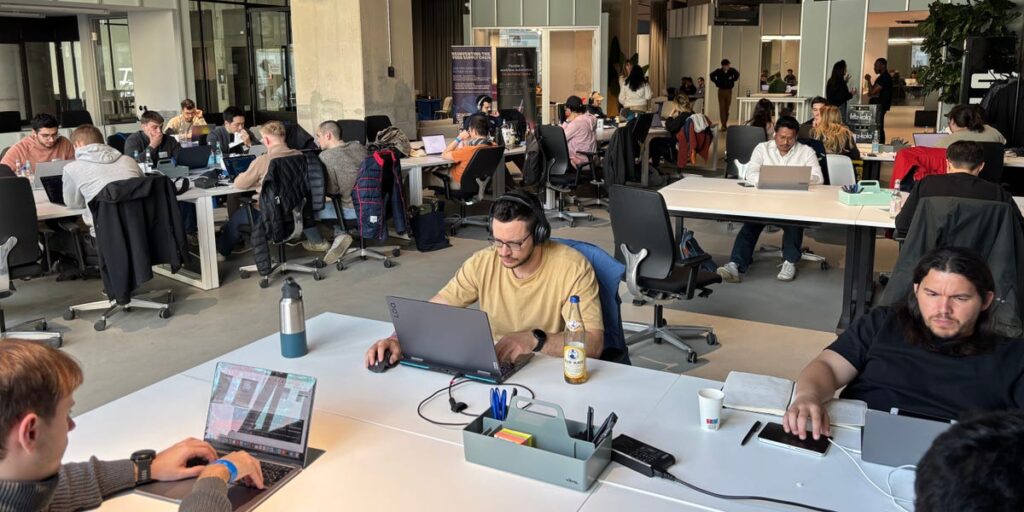Hackathons bring together computer engineers to rapidly solve technical problems. Now, they are increasingly helping startups solve another problem: scouting AI talent.
The event, which brings people together for around 24 to 72 hours to build a software product, gained traction in Silicon Valley in the 2000s and became a staple affair for Big Tech companies like Meta.
But after the pandemic, hackathons were slow to get going again, said Bela Wiertz, founder of Tech: Europe, and organizer of multiple AI hackathons across the continent.
That changed with the AI boom.
Wiertz said that, since the arrival of ChatGPT in late 2022, more research labs and AI startups have been arranging hackathons in cities with less “tech organization” in a bid to bring together top talent.
And the events’ talent-pulling power is making hackathons “a viable way for hot AI startups to compete with Big Tech for a top talent pool,” Zoe Qin, vice president at Dawn Capital, told Business Insider.
Big Tech companies typically have a major advantage over startups in the talent market: they can outspend them in recruitment and entice candidates with substantial compensation packages.
Hackathons are one way for startups to level the playing field.
“Startups cannot spend as much money on LinkedIn ads or copy what Big Tech do in terms of prestige, but they can show that they’re more agile, and more approachable, that they’re more committed during a hackathon,” said Benjamin Wolba, the founder of European Defense Tech Hub, which organizes hackathons across the continent.
In some cases, startups use hackathons to scout early-career talent that they might not reach during traditional hiring processes.
Angelo Giacco, an Imperial College London and ETH Zurich graduate, participated in an AI hackathon organized by ElevenLabs in November. Two weeks later, he landed a job offer as an engineer at the AI startup.
“I wouldn’t even have considered applying if I hadn’t gone to the hackathon,” he told BI. “We’re now hiring a few more people from hackathons, and we’ve launched one in seven different countries,” he added.
It’s not just junior roles. Dawn Capital’s Qin said that after some hackathons, she’s seen some startups go after “high-performing candidates, or in the case of a hackathon run by a tech company itself, their engineers who have performed really well.”
Often, AI startups want entrepreneurial talent that’s not rooted in a specific background, and recruiting from a hackathon allows these upstarts to find people “who want to tinker, build, and make things better — who may not necessarily match a classic profile of a computer scientist who wants to work in Big Tech,” Qin added.
Bela Wiertz
While traditional AI research labs may not hire pure research talent from hackathons, it’s useful for them to source solutions and customer-facing engineers who can build up the technology at the application layer.
“For the foundation labs and all the infrastructure partners like Mistral and Eleven Labs, they’re labs, but they’re selling their technology as an infrastructure,” said Wiertz. “So for them, yes, it’s about hiring, but it’s also the adoption of the technology in the ecosystem.”
Non-technical talent also has a shot
Increasingly, more people from non-technical backgrounds are using AI coding assistants to vibe code and create technical products. That has lowered the barrier to entry for coding-related projects and broadened the talent pool that participates in hackathons.
“University can be so theoretical, but hackathons help us to tackle real-life problems and get projects off the ground,” said Franziska Harzheim, a venture scout at Flashpoint who has participated in multiple AI hackathons.
With a degree in business analytics, Harzheim has still found a way to leverage her background to build an AI product with a team. “I feel like those hackathons are not about having a team of five super-experienced coders. It’s more like we look at everyone’s skill set, and according to that, we divide the tasks,” she said. “If you’re willing to learn something new on the spot, this is your space, it’s amazing.”
They’re also a valuable opportunity for companies to assess potential candidates from technical and non-technical backgrounds.
“You get to see how people perform, whether they earn the food or are actually doing stuff in real life, not in an assessment center,” European Defense Tech Hub’s Wolba said. “You get to see them working on the inside — it could be very information dense, so it’s a time-effective way to understand whether you want to work with this person.”

